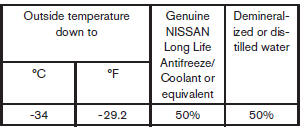Engine cooling system
The engine cooling system is filled at the factory with Genuine NISSAN Engine Coolant to provide year-round anti-freeze and coolant protection.
The anti-freeze solution contains rust and corrosion inhibitors. Additional engine cooling system additives are not necessary.
WARNING:
- Never remove the radiator or coolant reservoir cap when the engine is hot.
Wait until the engine and radiator cool down. Serious burns could be caused by high pressure fluid escaping from the radiator. See precautions in If your vehicle overheats found in the In case of emergency section of this manual.
- The radiator is equipped with a pressure type radiator cap. To prevent engine damage, use only a genuine NISSAN radiator cap.
CAUTION:
When adding or replacing coolant, be sure to use only a Genuine NISSAN Long Life Antifreeze/Coolant or equivalent with the proper mixture ratio of 50% anti-freeze and 50% demineralized or distilled water.
The use of other types of coolant solutions other than Genuine NISSAN Long Life Antifreeze/Coolant or equivalent, may damage the engine cooling system.

See also:
2011 Nissan Cube review
For 2010, Nissan has added another trim level to the boxy Cube, the Krom
(with a long O, pronounced "chrome"). The Cube is otherwise unchanged for 2010
(see them compared), and Kelsey Ma ...
Cleaning interior
Occasionally remove loose dust from the interior
trim, plastic parts and seats using a vacuum
cleaner or soft bristled brush. Wipe the vinyl and
leather surfaces with a clean, soft cloth dampened
...
2012 Nissan Versa review
The 2012 Nissan Versa sedan is about as compelling as an old dishwasher, but
its fuel efficiency, roominess and unrivaled value will get a lot of shoppers to
overlook that.
Economy cars boast sh ...
